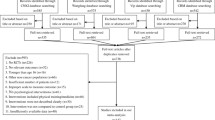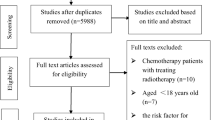Abstract
Purpose
This systematic review was performed to identify the association between benefit finding (BF) and anxiety, depression, and distress, as well as to find factors related to BF in adult cancer patients.
Methods
Five English databases and four Chinese databases were searched to identify eligible articles about BF in adult cancer patients from inception to 4 July 2021. Literature screening, data extraction, and quality assessment were carried out by two reviewers independently according to the inclusion and exclusion criteria. Qualitative synthesis was used to summarize the results.
Results
Twenty-one studies involving 9601 cancer patients were included in this study. Qualitative analysis showed that BF was negatively related to anxiety, depression, and distress. Factors associated with BF included sociodemographic factors, disease-related factors, and psychological and environmental factors.
Conclusions
Healthcare providers should pay attention to the summarized factors of BF and construct intervention programs based on the controllable factors to improve BF in adult cancer patients, thus promoting the recovery of patients.


Similar content being viewed by others
Data availability
The data that support the findings of this study are shown in Table 1.
Code availability
Not applicable.
Change history
25 April 2022
Updated due to the missing author contribution.
References
Sung H, Ferlay J, Siegel RL, Laversanne M, Soerjomataram I, Jemal A, Bray F (2021) Global cancer statistics 2020: GLOBOCAN estimates of incidence and mortality worldwide for 36 cancers in 185 countries. CA Cancer J Clin 71(3):209–249. https://doi.org/10.3322/caac.21660
Pongthavornkamol K, Lekdamrongkul P, Pinsuntorn P, Molassiotis A (2019) Physical symptoms, unmet needs, and quality of life in Thai cancer survivors after the completion of primary treatment. Asia Pac J Oncol Nurs 6(4):363–371. https://doi.org/10.4103/apjon.apjon_26_19
Fox RS, Ancoli-Israel S, Roesch SC, Merz EL, Mills SD, Wells KJ, Sadler GR, Malcarne VL (2020) Sleep disturbance and cancer-related fatigue symptom cluster in breast cancer patients undergoing chemotherapy. Support Care Cancer 28(2):845–855. https://doi.org/10.1007/s00520-019-04834-w
Baden M, Lu L, Drummond FJ, Gavin A, Sharp L (2020) Pain, fatigue and depression symptom cluster in survivors of prostate cancer. Support Care Cancer 28(10):4813–4824. https://doi.org/10.1007/s00520-019-05268-0
Ji J, Zhu H, Zhao JZ, Yang YQ, Xu XT, Qian KY (2020) Negative emotions and their management in Chinese convalescent cervical cancer patients: a qualitative study. J Int Med Res 48(9):300060520948758. https://doi.org/10.1177/0300060520948758
Baziliansky S, Cohen M (2021) Emotion regulation and psychological distress in cancer survivors: a systematic review and meta-analysis. Stress. health : Journal Int Soc Investig of Stress 37(1):3–18. https://doi.org/10.1002/smi.2972
Yi JC, Syrjala KL (2017) Anxiety and depression in cancer survivors. Med Clin North Am 101(6):1099–1113. https://doi.org/10.1016/j.mcna.2017.06.005
Boyes AW, Girgis A, D’Este CA, Zucca AC, Lecathelinais C, Carey ML (2013) Prevalence and predictors of the short-term trajectory of anxiety and depression in the first year after a cancer diagnosis: a population-based longitudinal study. J Clin Oncol 31(21):2724–2729. https://doi.org/10.1200/jco.2012.44.7540
Mosher CE, Adams RN, Helft PR, O’Neil BH, Shahda S, Rattray NA, Champion VL (2017) Positive changes among patients with advanced colorectal cancer and their family caregivers: a qualitative analysis. Psychol Health 32(1):94–109. https://doi.org/10.1080/08870446.2016.1247839
Tomich PL, Helgeson VS (2004) Is finding something good in the bad always good? Benefit finding among women with breast cancer. Health Psychol 23(1):16–23. https://doi.org/10.1037/0278-6133.23.1.16
Taylor S (1983) Adjustment to threatening events - a theory of cognitive adaptation. Am Psychol 38(1161–1173. https://doi.org/10.1037/0003-066X.38.11.1161
Tennen H, Affleck G (2002) Benefit-finding and benefit-reminding. Handbook of positive psychology. Oxford University Press, New York, pp 584–597
McGregor BA, Antoni MH, Boyers A, Alferi SM, Blomberg BB, Carver CS (2004) Cognitive-behavioral stress management increases benefit finding and immune function among women with early-stage breast cancer. J Psychosom Res 56(1):1–8. https://doi.org/10.1016/s0022-3999(03)00036-9
Lin Y, Luo X, Li J, Xu Y, Li Q (2021) The dyadic relationship of benefit finding and its impact on quality of life in colorectal cancer survivor and spousal caregiver couples. Support Care Cancer 29(3):1477–1486. https://doi.org/10.1007/s00520-020-05602-x
Pascoe L, Edvardsson D (2013) Benefit finding in cancer: a review of influencing factors and health outcomes. Eur J Oncol Nurs 17(6):760–766. https://doi.org/10.1016/j.ejon.2013.03.005
Liberati A, Altman DG, Tetzlaff J, Mulrow C, Gøtzsche PC, Ioannidis JP, Clarke M, Devereaux PJ, Kleijnen J, Moher D (2009) The PRISMA statement for reporting systematic reviews and meta-analyses of studies that evaluate healthcare interventions: explanation and elaboration. BMJ 339(b2700. https://doi.org/10.1136/bmj.b2700
Aromataris E, Fernandez R, Godfrey CM, Holly C, Khalil H, Tungpunkom P (2015) Summarizing systematic reviews: methodological development, conduct and reporting of an umbrella review approach. Int J Evid Based Healthc 13(3):132–140. https://doi.org/10.1097/xeb.0000000000000055
Liberali R, Del Castanhel F, Kupek E, Assis MAA (2021) Latent class analysis of lifestyle risk factors and association with overweight and/or obesity in children and adolescents: systematic review. Child obes (Print) 17(1):2–15. https://doi.org/10.1089/chi.2020.0115
Antoni MH, Lehman JM, Kilbourn KM, Boyers AE, Culver JL, Alferi SM, Yount SE, McGregor BA, Arena PL, Harris SD, Price AA, Carver CS (2001) Cognitive-behavioral stress management intervention decreases the prevalence of depression and enhances benefit finding among women under treatment for early-stage breast cancer. Health Psychol 20(1):20–32. https://doi.org/10.1037//0278-6133.20.1.20
Hu Y, Huang J, Zhang T, Wang D, Li H (2014) Reliability and validity of the Benefit Finding Scale for breast cancer patients. Chin J Prac Nurs 30(33):27–29. https://doi.org/10.3760/cma.j.issn.1672-7088.2014.33.008
Weaver KE, Llabre MM, Lechner SC, Penedo F, Antoni MH (2008) Comparing unidimensional and multidimensional models of benefit finding in breast and prostate cancer. Qual Life Res 17(5):771–781. https://doi.org/10.1007/s11136-008-9348-z
Liu Z, Gudenkauf L, Zhang L, Wang Z (2016) Application and evaluation of Benefit Finding Scale (BFS) in early-stage cancer patients from China. Eur J Oncol Nurs 23(87–96. https://doi.org/10.1016/j.ejon.2016.04.005
Lassmann I, Dinkel A, Marten-Mittag B, Jahnen M, Schulwitz H, Gschwend JE, Herkommer K (2021) Benefit finding in long-term prostate cancer survivors. Support Care Cancer 29(8):4451–4460. https://doi.org/10.1007/s00520-020-05971-3
Wang Y, Zhu X, Yang Y, Yi J, Tang L, He J, Chen G, Li L, Yang Y (2015) What factors are predictive of benefit finding in women treated for non-metastatic breast cancer? A prospect study Psychooncology 24(5):533–539. https://doi.org/10.1002/pon.3685
Lv Q, Liu M (2017) Study on the level of benefit finding and its influencing factors in female patients with breast cancer during chemotherapy. Modern Preventive Medicine 44(14): 2537–2540+2548.
Wang Q (2016) Status and influencing factors of benefit finding in patients with non-small cell lung cancer. Chin J Prac Nurs 32(34):2681–2684. https://doi.org/10.3760/cma.j.issn.1672-7088.2016.34.012
Kinsinger DP, Penedo FJ, Antoni MH, Dahn JR, Lechner S, Schneiderman N (2006) Psychosocial and sociodemographic correlates of benefit-finding in men treated for localized prostate cancer. Psychooncology 15(11):954–961. https://doi.org/10.1002/pon.1028
Dunn J, Occhipinti S, Campbell A, Ferguson M, Chambers SK (2011) Benefit finding after cancer: the role of optimism, intrusive thinking and social environment. J Health Psychol 16(1):169–177. https://doi.org/10.1177/1359105310371555
Li Q, Lin Y, Zhou H, Xu Y, Yang L, Xu Y (2018) Factors moderating the mutual impact of benefit finding between Chinese patients with cancer and their family caregivers: a cross-sectional study. Psychooncology 27(10):2363–2373. https://doi.org/10.1002/pon.4833
Liu Z, Zhang L, Cao Y, Xia W, Zhang L (2018) The relationship between coping styles and benefit finding of Chinese cancer patients: the mediating role of distress. Eur J Oncol Nurs 34(15–20. https://doi.org/10.1016/j.ejon.2018.03.001
Mei Y, Li H, Yang Y, Su D, Zhang T, Dou W, Wang H, Shen Q (2016) Related factors of benefit finding in patients with breast cancer. Chin Ment Health J 30(06):413–417. https://doi.org/10.3969/j.issn.1000-6729.2016.06.003
Urcuyo KR, Boyers AE, Carver CS, Antoni MH (2005) Finding benefit in breast cancer: relations with personality, coping, and concurrent well-being. Psychol Health 20(2):175–192. https://doi.org/10.1080/08870440512331317634
Jansen L, Hoffmeister M, Chang-Claude J, Brenner H, Arndt V (2011) Benefit finding and post-traumatic growth in long-term colorectal cancer survivors: prevalence, determinants, and associations with quality of life. Br J Cancer 105(8):1158–1165. https://doi.org/10.1038/bjc.2011.335
Harrington S, McGurk M, Llewellyn CD (2008) Positive consequences of head and neck cancer: key correlates of finding benefit. J Psychosoc Oncol 26(3):43–62. https://doi.org/10.1080/07347330802115848
Llewellyn CD, Horney DJ, McGurk M, Weinman J, Herold J, Altman K, Smith HE (2013) Assessing the psychological predictors of benefit finding in patients with head and neck cancer. Psychooncology 22(1):97–105. https://doi.org/10.1002/pon.2065
Manne SL, Kashy DA, Virtue S, Criswell KR, Kissane DW, Ozga M, Heckman CJ, Stapleton J, Rodriguez L (2018) Acceptance, social support, benefit-finding, and depression in women with gynecological cancer. Qual Life Res 27(11):2991–3002. https://doi.org/10.1007/s11136-018-1953-x
Li Z, Liu Z, Zhang L (2020) Benefit finding and influencing factors in patients with early-stage colorectal cancer. Chin Gen Prac 23(35): 4459–4464. https://doi.org/10.12114/j.issn.1007-9572.2020.00.597
Luszczynska A, Mohamed N, Schwarzer R (2005) Self-efficacy and social support predict benefit finding 12 months after cancer surgery: the mediating role of coping strategies. Psychology Health & Medicine - PSYCHOL HEALTH MED 10(https://doi.org/10.1080/13548500500093738
Niu J, Cui J, Wang J, Yang K, Li H, Yin C (2019) Pathway analysis of the effects of self-efficacy, social support and mental resilience on benefit discovery in breast cancer patients undergoing chemotherapy. Chin Med Herald 16(32):140–143
Zhang L, Song X, Wang W, Zhang C, Zhou J, Li Y, Yang J, Ma J, Yang X, Qiu X, Qiao Z, Yang Y (2018) Mediating effect of self-efficacy on correlation between family adaptability, cohesion and benefit finding among cervical cancer patients. Chin J Publ Heal 34(01):111–113. https://doi.org/10.11847/zgggws1115167
Zhang R, Sun C, Kang N, Luo Y, Guo L (2018) Relationship between positive emotion, self-efficacy and benefit finding in convalescent breast cancer patients. Guandong Med J 39(12):1865–1868. https://doi.org/10.3969/j.issn.1001-9448.2018.12.027
Wen KY, Ma XS, Fang C, Song Y, Tan Y, Seals B, Ma GX (2017) Psychosocial correlates of benefit finding in breast cancer survivors in China. J Health Psychol 22(13):1731–1742. https://doi.org/10.1177/1359105316637839
Crawford JJ, Vallance JK, Holt NL, Courneya KS (2015) Associations between exercise and posttraumatic growth in gynecologic cancer survivors. Support Care Cancer 23(3):705–714. https://doi.org/10.1007/s00520-014-2410-1
Kim JE, Song IH, Lee SH (2017) Gender differences of stressful life events, coping style, symptom severity, and health-related quality of life in patients with panic disorder. J Nerv Ment Dis 205(9):714–719. https://doi.org/10.1097/nmd.0000000000000696
Fischer IC, Cripe LD, Rand KL (2018) Predicting symptoms of anxiety and depression in patients living with advanced cancer: the differential roles of hope and optimism. Support Care Cancer 26(10):3471–3477. https://doi.org/10.1007/s00520-018-4215-0
Ye ZJ, Peng CH, Zhang HW, Liang MZ, Zhao JJ, Sun Z, Hu GY, Yu YL (2018) A biopsychosocial model of resilience for breast cancer: a preliminary study in mainland China. Eur J Oncol Nurs 36(95–102. https://doi.org/10.1016/j.ejon.2018.08.001
Stewart DE, Yuen T (2011) A systematic review of resilience in the physically ill. Psychosomatics 52(3):199–209. https://doi.org/10.1016/j.psym.2011.01.036
Funding
This work was supported by the National Natural Science Foundation of China (82174129); the Postgraduate Research & Practice Innovation Program of Jiangsu Province (KYCX20_3006); the Jiangsu Key Laboratory of Zoonosis, China (HX2002); and the Qinglan Project of Yangzhou University, China (YDRS [2018] 44).
Author information
Authors and Affiliations
Contributions
ZPT contributed to the conception, study supervision, and critical revision of the manuscript. CC contributed to conception, literature research, literature sections, and interpretation, and drafted the manuscript. LXY contributed to literature research and literature sections. GWN contributed to interpretation. SXC contributed to the revision of the manuscript.
Corresponding author
Ethics declarations
Ethics approval
Not applicable.
Consent to participate
Not applicable.
Consent for publication
All authors read and approved the final manuscript.
Conflict of interest
The authors declare no competing interests.
Additional information
Publisher's note
Springer Nature remains neutral with regard to jurisdictional claims in published maps and institutional affiliations.
Pingting Zhu and Chen chen should be considered joint first authors.
Rights and permissions
About this article
Cite this article
Zhu, P., Chen, C., Liu, X. et al. Factors associated with benefit finding and mental health of patients with cancer: a systematic review. Support Care Cancer 30, 6483–6496 (2022). https://doi.org/10.1007/s00520-022-07032-3
Received:
Accepted:
Published:
Issue Date:
DOI: https://doi.org/10.1007/s00520-022-07032-3




